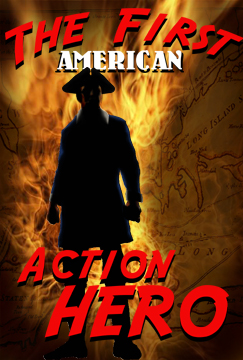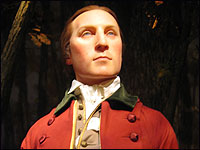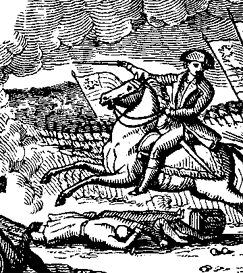
May 2008
It was a 900-mile journey
at a time when most people would never stray more than
50 miles from their home in their lifetime. A journey of
freezing temperatures, treacherous river crossings,
Indian attacks and unknown wilderness, all undertaken to
deliver a message that would change the world.
The courier sent on this vital mission was only 21 years
old, but experienced on the frontier. He had explored
and surveyed in the
Ohio
area with Native American guides, and was known as one
of the best horsemen anyone had ever seen. A giant with
large hands, a muscular frame and piercing blue eyes,
his name was George Washington. Shortly after this
78-day adventure was over, the Governor of Virginia,
Robert Dinwiddie, saw to it that Washington’s journal was published in both America and London.
Suddenly, George Washington was an
intercontinental hero, and at age 22 was promoted to
Lieutenant Colonel in the Virginia Militia. The message
he had delivered to Fort Dusquesne claimed that territory for England and
demanded that the French forces leave the area.

We live in an age
that can hardly fathom the young, energetic, physically
powerful George Washington. In his own lifetime he would
become a mythic figure, but not for being a marble
statue or a silent still portrait.
He was, for all intents and purposes, an 18th
century action hero. In our modern eyes you would need
to combine Shaquille O’Neil’s physical presence with
Bruce Willis and a bit of Mel Gibson’s William Wallace
to even come close.
We only see the icon today, the unsmiling, white
haired man who we are told in school fathered our
country.
This stagnant image steals from us the flesh and blood
man. A man who loved sport and rode his horse as if it
were an extension of his person, who was so fond of
dancing that at one party he danced for four hours
straight. A
man who rode in between lines of gunfire to rally his
troops to victory.
Only months after Washington
made the journey to Fort Dusquesne with Governor Dinwiddie’s message, Washington was sent back with 150 men to assert Virginia’s claim in the Ohio Valley.
When he came across a group of French and Indian
diplomats he believed were planning an attack the rash
young Lt. Colonel ordered his own attack. Ten men were
killed including a French diplomat and Washington was surrounded. The campaign ended
in defeat and had started the French and Indian War in America. A
humiliated Washington
returned to Virginia, his military
career appeared to be finished.
Washington
resigned his commission.
SUPPORT THE REVOLUTION
Donate Today
|
Like all great action stories his hour of darkness
proved a turning point for Washington. This is the moment in the hero
myth where the wound that seems like it should be fatal
brings the hero down and he must make the choice to rise
up again. Two years pass before Washington returns to the
frontier as volunteer aide to General Edward Braddock.
Braddock was an inept commander but his greatest flaw
was that he would not listen to any junior officers even
in their areas of experience and expertise. This flaw
would end up costing the lives of
almost 1000 of Braddock’s troops and the life of
the man himself. Every other officer serving alongside
Washington was killed or wounded at the
battle near the Monongahela river,
targeted by the Indian warriors. In the midst of this
terrible slaughter Washington kept his head and tried to rally the Virginia troops.

Two horses were shot out from under him but he managed
to organize a retreat and get the survivors to safety.
When the battle was over Washington found four bullet holes in his
uniform. Stories still exist that
the Indians believed
the tall officer was protected by a higher power
since none of their bullets would bring him down. In
recognition of his conduct in battle
Washington
was given command of
Virginia’s entire military force
on the frontier. Stories about him again filled the
newspapers.
Washington
would later enter politics and eventually his election
to the 2nd Continental Congress at
the age of 43 would turn the famous Colonel
Washington of Virginia into General
Washington, Commander of the Revolutionary
Army. His
exploits would continue to gain in stature through eight
years of war. The crossing of the
Delaware
and surprise attack on
Trenton.
Washington’s leading the charge into enemy guns
at
Princeton. Even when his own troops began to
fight each other he was reported to have jumped in
between them and physically pulled apart the brawlers,
tossing them aside. As a leader he was known for always
hearing the opinions of his Junior Officers and believed
that if he let people continue to talk, eventually he
would know as much as they did. When the war finally
ended he was the most powerful man in
America, revered by his
countrymen and commander of a victorious army. That’s
when he did what all good action heroes do, he rode off
into the sunset. The world stood by in awe as
Washington
casually set aside the power he had held almost
absolutely. They all said he could have been a king but
like the Roman hero Cincinnatus he retuned to his farm
after saving his world.
It would only be 4 years before his countrymen
would beg
Washington
to return to service.
Elected unanimously twice to serve as president,
he weathered the storms of politics for eight years
before he again resigned to private life. Those are the
years of Washington the executive, Washington the
builder, Washington the keystone supporting the weight
of the new Republic. History would call on Washington the Action hero one last time. In
1798 when it looked like War with France was inevitable and fear had
swept over the country there could be only one person
the people knew could protect them.
Washington
was 67 years old in an age when 67 was considered an old
man but in June of 1799 he was appointed Commander of
the new army.
He had none of his original teeth left, his
red/brown hair was long since grey and now snowy white
but he was still the hero of the people.
France
negotiated for peace and by December
Washington
was dead.
America’s first action
hero was gone.
|